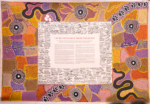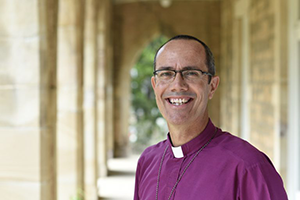ABM Archive Website
THIS WEBSITE CONTAINS ARCHIVE MATERIALS FOR HISTORICAL REFERENCE ONLY
For up-to-date information, including our latest appeals, news, and resources, please visit our current website.
A Prophetic call to modern Australia
July 15, 2019

“I think there is a deep need for us to listen to this ‘Statement from the Heart’, with an openess to the possibility that God’s Spirit will be in the midst of it, and that the healing thought to be impossible… by God’s grace will become possible.”
Last week Bishop Cam Venables (Western Regional Bishop in the Anglican Church Southern Queensland) reminded us that God often acts from the margins and speaks through the ones who appear powerless. He calls our attention to the ‘Statement from the Heart’ as a prophetic call to modern Australia.
You can read the full sermon below, or find out more about the Statement from the Heart here (www.abmission.org/voice).
7 July at 11:27
 |
|
©Anglican Church Southern Queensland. |
When I was growing up the names of people and places described in Bible readings sounded exotic and strange. They were characters in a stories set in contexts very different to my own. The Old Testament reading today (2Kings 5:1-14) is a bit like this, because there’s a mighty warrior called Naaman, who worked for the king of Aram, and there are the romantically named Syrian rivers Abana and Pharpar.
Now, I have never met a man called Naaman, and my contact with royalty has been limited… so this story does sound a bit exotic. But, I have met many people in Toowoomba over the last two years who have escaped persecution and violence in Syria. Christians who have lived and studied in Damascus, and who now call Toowoomba home. So, when I go to the supermarket, or a particular church, I am now likely to meet friends with Arabic names like Malek and Yousef… but, not Naaman. At least not yet!
It’s a reminder that there has been conflict between and within Middle Eastern countries for millennia, and potentially this brings a new perspective to the way we read and hear biblical writing. Somehow, the people and place names are less exotic today, because we know people who have come from those places, and their names have become familiar because of regular news reporting.
Naaman was the Aramean army commander at that time, and he had successfully invaded and occupied part of Israel. ‘Though he was a well-regarded leader in his country, he suffered from the insidious disease called leprosy. Interesting to note that in Aramean culture Naaman was not excluded from leadership or community because of this disease, whereas in Jewish culture he would have been stripped of his office, and would not have been allowed to live within the walls of a city.
A young slave girl from Israel, forcibly taken from her community, served Naaman’s wife and through this role in household observed that her wife’s husband had leprosy. I guess she was reasonably treated because she suggested to her mistress that there was a prophet in Israel who could give healing to her husband. If she was being treated badly, it’s likely that she would have said nothing and hoped he would die a slow and agonising death!
Naaman’s wife passed on the news, and Naaman shared it with his boss, the king of Aram. The king of Aram then got a heap of money together and wrote a letter to the King of Israel asking if he could arrange for Naaman to be healed. Not unreasonably the king of Israel had a panic attack because he had no idea how somebody could be healed of leprosy, and concluded that the King of Aram just wanted an excuse to invade the rest of Israel.
Interesting to note that the King of Israel was either unfamiliar with the healing ministry of Elisha, or he just didn’t have confidence it would work. But, news of the request got to Elisha and he asked for Naaman to be sent to him so that there was opportunity for people to see that God had the power to heal.
Naaman went, and because of his social and political status rightly expected a face to face meeting with the prophet Elisha. However, Elisha did not play ball and simply sent the instruction for Naaman to wash seven times in the river Jordan. I’ve seen photos of the river Jordan and it’s not very impressive, so I understand why Naaman angrily jumped up and down affirming that he was going back to wash in some much better rivers in Syria! Happily for him, his servants advised Naaman to give it a go, and he was healed. I reckon Naaman returned thoughtfully to his home, wondering about the God who had restored his health.
There are some lovely ironies in this story which leave us with important questions. The powerful King of Israel did not know about the healing power of God, or did not trust Elisha to deliver such healing. Rather it was the captive Israeli slave girl who had affirmed the potential source of healing. In a society that did not value women, or slaves, as much as men, and those who were free, it seems amazing that the young girl’s wisdom and insight is recorded at all. And, in a culture where the lives of servants depended on the good will of their masters… it seems amazing again that Naaman’s servants challenged his arrogance, and persuaded him to wash in the muddy waters of the Jordan as Elisha had directed.
So, for us there is the uncomfortable reminder that God’s wisdom can come from those that society considers least. I wonder who they are for us in Australia? I’m not saying that wisdom cannot come from political and religious leaders, or from the leaders of business. But, I am saying that we have to take seriously the insight that God’s wisdom can often come from those considered least.
Among those considered least in our society are the Aboriginal and Torres Strait Island peoples of Australia. Between 2016 and 2017 there were twelve regional consultations across Australia with Aboriginal and Torres Strait Island communities, and these consultations sent delegates and ideas to a First Nations National Constitutional Convention, held at Uluru in May 2017.
This was the most extensive consultation of indigenous peoples in Australia ever, and the first time that such a large group from so many places had come together. On the 26th May 2017 they presented an affirmation to Australia that was titled, ‘The Statement from the Heart’.
Within the wisdom of this short document is the following affirmation, ‘We seek constitutional reforms to empower our people, and take a rightful place in our own country. When we have power over our destiny, our children will flourish. They will walk in two worlds and their culture will be gift to their country.’
I think it is a prophetic piece of writing that seems to have been largely ignored since it was published.
But, if Naaman’s wife had not listened to her slave girl, healing would not have taken place. And, if Naaman had not listened to his wife, or his servants, healing would not have taken place…
I think there is a deep need for us to listen to this ‘Statement from the Heart’, with an openess to the possibility that God’s Spirit will be in the midst of it, and that the healing thought to be impossible… by God’s grace will become possible.
Let’s pray…
Living God, we give thanks for the ways that your Word challenges us to think about healing and listening. We ask for the wisdom to listen, and the courage to follow the leading of your Spirit; and, we pray in the name of Jesus. Amen.


